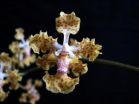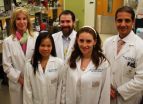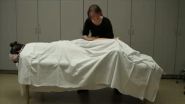(Press-News.org) RIVERSIDE, Calif. — One day about eight years ago, Katia Silvera, a postdoctoral scholar at the University of California, Riverside, and her father were on a field trip in a mountainous area in central Panama when they stumbled upon an orchid they had never seen before.
Unable to identify it, they contacted German Carnevali, a world authority on orchids. The orchid turned out to be an unnamed species. So Carnevali recently named it after the Silveras: Lophiaris silverarum.
"Lophiaris" is the genus name, comprising about 40 species in the world. Carnevali, the director of the Natural Resources Department at the Scientific Center of Yucatan, Mexico, announced the new orchid species in a research paper published in the March issue of the journal Phytotaxa.
Naming a species is invariably a long process. It can take many years to officially name a plant species, the time depending on how well the plant group is studied and whether there is funding to do research on that particular group.
"Orchids are a difficult and confusing taxonomic group," said Silvera, who joined the lab of Norman Ellstrand, a professor of genetics at UC Riverside, in 2011. "People who specialize in the Orchid Family usually spend years naming different species based on DNA and morphology. Sometimes plants can look alike morphologically, but DNA informs us that they are very different species, which makes naming the species difficult."
Silvera explained that because the Orchid Family is so large, there are many species that have not been found before. As a result, new orchid species are being named every year and the number is rising.
"The diversity of orchids is best seen in the tropics, where, unfortunately, habitat is being destroyed very fast," she said. "As a result, we are rapidly losing the diversity of orchid species. Although there are many orchid species unnamed in nature, it is actually quite difficult to determine for sure that an orchid is unnamed. They are difficult to find and difficult to tell apart. Orchid species are the raw materials for hybrids, and there is a lot to discover about how these species evolved and became such a successful group. Orchid research will only thrive if efforts to conserve tropical rainforest are put in place."
The Orchid Family contains the largest number of plant species in the world. They are the most collected group of plants by hobbyists. Close to 30,000 known species exist worldwide; many remain undiscovered. Panama alone has about 1,100 known orchid species. The United States has about 200 known orchid species.
Orchids are unique in that the flower's female and male reproductive parts are fused together. An interesting aspect is that orchids can easily hybridize or cross. As a result, some 300,000 orchid hybrids are man-made and commercially available to the public. Not found in nature, they only occur in laboratories and greenhouses for commercial purpose.
Currently, Lophiaris silverarum is known to grow only in central Panama. It is not known if it grows in other areas of Central America. The plant blooms only in November, the flowers lasting about a month. It is not sold in the US because it is very rare and it reproduces very slowly.
"We are in the process of propagating the species in vitro in Panama for commercial purposes," Silvera said. "My father, Gaspar Silvera, is the owner of a small orchid company in Panama that specializes in propagating native orchid species but because L. silverarum grows slowly, taking about four years to reproduce in vitro, from seed to the first bloom, it will take many years before it is available to the public in Panama first, and then made commercially available outside of Panama."
INFORMATION:
About Katia Silvera
Silvera grew up in Panama, and was always surrounded by plants. As a child she developed a fascination for plants and began learning as much as she could about them. Because her parents own a commercial orchid business, she learned about orchids and their diversity very early on.
She studied plant biology at the University of Panama. After graduating, she worked with the Smithsonian Tropical Research Institute in different aspects of plant biology, even as a tour guide. For her graduate studies she came to the United States. She received a master's degree at the University of Florida and a Ph.D. at the University of Nevada Reno.
Silvera's research focuses on the evolution of photosynthesis in orchids. At UCR she processes plant material collected in the field in Panama. Currently, she also holds a postdoctoral fellowship from the Smithsonian Tropical Research Institute (STRI) that allows her to study orchid species in the field in Panama, collect samples, and transport them to UCR for analysis.
She has been awarded a membership in the National Scientific Investigators System by the Panamanian government, an honor bestowed on only distinguished researchers in Panama.
Her postdoctoral appointments at STRI and UCR run through October 2014.
The University of California, Riverside is a doctoral research university, a living laboratory for groundbreaking exploration of issues critical to Inland Southern California, the state and communities around the world. Reflecting California's diverse culture, UCR's enrollment has exceeded 21,000 students. The campus opened a medical school in 2013 and has reached the heart of the Coachella Valley by way of the UCR Palm Desert Center. The campus has an annual statewide economic impact of more than $1 billion. A broadcast studio with fiber cable to the AT&T Hollywood hub is available for live or taped interviews. UCR also has ISDN for radio interviews. To learn more, call (951) UCR-NEWS.
Orchid named after UC Riverside researcher
'Lophiaris silverarum' is known to grow only in central Panama
2014-04-17
ELSE PRESS RELEASES FROM THIS DATE:
New MRSA superbug emerges in Brazil
2014-04-17
An international research team led by Cesar A. Arias, M.D., Ph.D., at The University of Texas Health Science Center at Houston (UTHealth) has identified a new superbug that caused a bloodstream infection in a Brazilian patient. The report appeared in the April 17 issue of The New England Journal of Medicine.
The new superbug is part of a class of highly-resistant bacteria known as methicillin-resistant Staphylococcus aureus or MRSA, which is a major cause of hospital and community-associated infections. The superbug has also acquired high levels of resistance to vancomycin, ...
Study IDs new cause of brain bleeding immediately after stroke
2014-04-17
Irvine, Calif., April 17, 2014 — By discovering a new mechanism that allows blood to enter the brain immediately after a stroke, researchers at UC Irvine and the Salk Institute have opened the door to new therapies that may limit or prevent stroke-induced brain damage.
A complex and devastating neurological condition, stroke is the fourth-leading cause of death and primary reason for disability in the U.S. The blood-brain barrier is severely damaged in a stroke and lets blood-borne material into the brain, causing the permanent deficits in movement and cognition seen ...
20 years of data shows treatment technique improvement for advanced abdominal cancer
2014-04-17
WINSTON-SALEM, N.C. – April 17, 2014 – Meaningful long-term survival is possible for selected patients suffering from advanced cancer of the abdomen when treated with cytoreductive surgery with Hyperthermic IntraPeritoneal Chemotherapy, or HIPEC, according to a first-of-its-size analysis by physicians at Wake Forest Baptist Medical Center.
Wake Forest Baptist has the largest reported, single-center experience with cytoreductive surgery and HIPEC, said lead author Edward A. Levine, M.D., and analysis of 20 years' worth of patient data shows that outcomes have clearly improved ...
Surprising material could play role in saving energy
2014-04-17
One strategy for addressing the world's energy crisis is to stop wasting so much energy when producing and using it, which can happen in coal-fired power plants or transportation. Nearly two-thirds of energy input is lost as waste heat.
Now Northwestern University scientists have discovered a surprising material that is the best in the world at converting waste heat to useful electricity. This outstanding property could be exploited in solid-state thermoelectric devices in a variety of industries, with potentially enormous energy savings.
An interdisciplinary team led ...
How vision makes sure that little fish do not get carried away
2014-04-17
This news release is available in German. Our eyes not only enable us to recognise objects; they also provide us with a continuous stream of information about our own movements. Whether we run, turn around, fall or sit still in a car – the world glides by us and leaves a characteristic motion trace on our retinas. Seemingly without effort, our brain calculates self-motion from this "optic flow". This way, we can maintain a stable position and a steady gaze during our own movements. Together with biologists from the University of Freiburg, scientists from the Max Planck ...
Massage therapy improves circulation, eases muscle soreness
2014-04-17
VIDEO:
Massage therapy improves general blood flow and alleviates muscle soreness after exercise, according to a study by researchers at the University of Illinois at Chicago.
Click here for more information.
Massage therapy improves general blood flow and alleviates muscle soreness after exercise, according to a study by researchers at the University of Illinois at Chicago.
The study, reported online in advance of print in the Archives of Physical Medicine and Rehabilitation, ...
Food shortages could be most critical world issue by mid-century
2014-04-17
WASHINGTON, D.C. -- The world is less than 40 years away from a food shortage that will have serious implications for people and governments, according to a top scientist at the U.S. Agency for International Development.
"For the first time in human history, food production will be limited on a global scale by the availability of land, water and energy," said Dr. Fred Davies, senior science advisor for the agency's bureau of food security. "Food issues could become as politically destabilizing by 2050 as energy issues are today."
Davies, who also is a Texas A&M AgriLife ...
Internet use may cut retirees' depression
2014-04-17
Spending time online has the potential to ward off depression among retirees, particularly among those who live alone, according to research published online in The Journals of Gerontology, Series B: Psychological Sciences and Social Sciences. In the article "Internet Use and Depression Among Retired Older Adults in the United States: A Longitudinal Analysis," the authors report that Internet use reduced the probability of a depressed state by 33 percent among their study sample.
Late-life depression affects between 5 and 10 million Americans age 50 and older. This new ...
A cross-section of the universe
2014-04-17
An image of a galaxy cluster taken by the NASA/ESA Hubble Space Telescope gives a remarkable cross-section of the Universe, showing objects at different distances and stages in cosmic history. They range from cosmic near neighbours to objects seen in the early years of the Universe. The 14-hour exposure shows objects around a billion times fainter than can be seen with the naked eye.
This new Hubble image showcases a remarkable variety of objects at different distances from us, extending back over halfway to the edge of the observable Universe. The galaxies in this image ...
Researcher looks at public perceptions around newborn testing
2014-04-17
TORONTO, April 17, 2014—While 94 per cent of Canadians surveyed said they would participate in public health programs that screen newborns for a specific number of genetic conditions, only 80 per cent said they would be willing to participate in screening that would sequence their newborns' genomes.
Most newborns in North America have a "heel prick test" in their first day or two of life in which a tiny amount of blood is taken from their heels and tested for about five to 54 conditions, depending on the state or province. Some conditions commonly tested for include cystic ...
LAST 30 PRESS RELEASES:
Scientists discover why we know when to stop scratching an itch
A hidden reason inner ear cells die – and what it means for preventing hearing loss
Researchers discover how tuberculosis bacteria use a “stealth” mechanism to evade the immune system
New microscopy technique lets scientists see cells in unprecedented detail and color
Sometimes less is more: Scientists rethink how to pack medicine into tiny delivery capsules
Scientists build low-cost microscope to study living cells in zero gravity
The Biophysical Journal names Denis V. Titov the 2025 Paper of the Year-Early Career Investigator awardee
Scientists show how your body senses cold—and why menthol feels cool
Scientists deliver new molecule for getting DNA into cells
Study reveals insights about brain regions linked to OCD, informing potential treatments
Does ocean saltiness influence El Niño?
2026 Young Investigators: ONR celebrates new talent tackling warfighter challenges
Genetics help explain who gets the ‘telltale tingle’ from music, art and literature
Many Americans misunderstand medical aid in dying laws
Researchers publish landmark infectious disease study in ‘Science’
New NSF award supports innovative role-playing game approach to strengthening research security in academia
Kumar named to ACMA Emerging Leaders Program for 2026
AI language models could transform aquatic environmental risk assessment
New isotope tools reveal hidden pathways reshaping the global nitrogen cycle
Study reveals how antibiotic structure controls removal from water using biochar
Why chronic pain lasts longer in women: Immune cells offer clues
Toxic exposure creates epigenetic disease risk over 20 generations
More time spent on social media linked to steroid use intentions among boys and men
New study suggests a “kick it while it’s down” approach to cancer treatment could improve cure rates
Milken Institute, Ann Theodore Foundation launch new grant to support clinical trial for potential sarcoidosis treatment
New strategies boost effectiveness of CAR-NK therapy against cancer
Study: Adolescent cannabis use linked to doubling risk of psychotic and bipolar disorders
Invisible harms: drug-related deaths spike after hurricanes and tropical storms
Adolescent cannabis use and risk of psychotic, bipolar, depressive, and anxiety disorders
Anxiety, depression, and care barriers in adults with intellectual and developmental disabilities
[Press-News.org] Orchid named after UC Riverside researcher'Lophiaris silverarum' is known to grow only in central Panama







